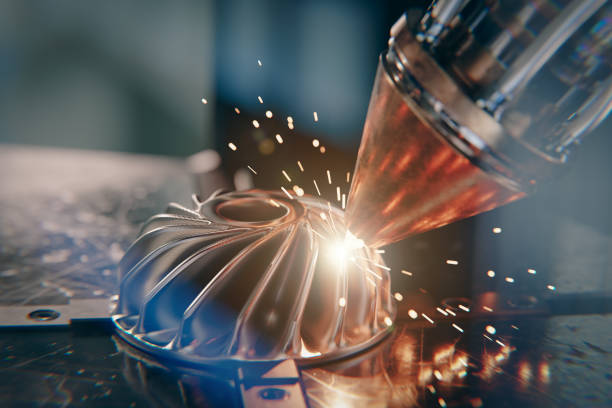Additive Manufacturing Execution Systems: A Comprehensive Overview
.png)
As additive manufacturing revolutionizes industries, manufacturers face new challenges in managing production, tracking materials, and ensuring quality control. To address these challenges and optimize their AM workflows, forward-thinking companies are turning to specialized software solutions known as Additive Manufacturing Execution Systems (MES).
Additive MES is designed to streamline and integrate various processes within the AM production lifecycle, making it easier for manufacturers to scale their operations and deliver high-quality parts consistently. By automating tasks, providing real-time visibility, and enabling data-driven decision-making, these systems are transforming the way companies approach additive manufacturing.
In this article, we'll dive deep into the world of Additive MES, exploring its key features, benefits, and how it can help manufacturers unlock the full potential of their AM operations. Whether you're a seasoned AM professional or just starting to explore this technology, understanding the role of Additive MES is crucial for staying competitive in today's rapidly evolving manufacturing landscape.
What is an Additive Manufacturing Execution System (MES)?
An Additive Manufacturing Execution System (MES) is a specialized software platform designed to manage, monitor, and control additive manufacturing operations on the shop floor. Unlike traditional MES solutions geared towards conventional manufacturing processes, Additive MES is tailored to handle the unique aspects of 3D printing—such as complex file formats, layer-by-layer production, and the use of various materials.
The primary goal of an Additive MES is to provide a holistic view of the entire AM production workflow, integrating data and processes for seamless management. This includes everything from order entry and job scheduling to machine monitoring, quality control, and post-processing. By centralizing all these functions within a single platform, Additive MES enables manufacturers to optimize their operations, reduce errors, and improve overall efficiency.
Key features of Additive MES include:
- Workflow Management: Additive MES automates and streamlines the AM production process, ensuring tasks are completed in the right order and with the necessary resources.
- Machine Connectivity: The software integrates with various AM machines, allowing for real-time monitoring of production status, machine health, and material usage—critical for identifying potential issues early and maintaining consistent quality.
- Data Collection and Analytics: Additive MES captures and analyzes data from every stage of the production process, providing valuable insights for process optimization and quality improvement. This data-driven approach empowers manufacturers to make informed decisions swiftly, ensuring manufacturing remains uninterrupted and efficient.
- Traceability and Compliance: With built-in traceability features, Additive MES helps manufacturers maintain a complete record of every part produced, from raw materials to finished product. This level of documentation is indispensable in sectors where product quality and regulatory compliance are non-negotiable, reinforcing customer and stakeholder confidence.
By leveraging these capabilities, Additive MES provides a powerful tool for manufacturers looking to scale their AM operations and deliver high-quality parts consistently. As the demand for additive manufacturing continues to grow across industries, implementing an Additive MES is becoming increasingly essential for companies that want to stay competitive and meet the evolving needs of their customers.
Key Benefits of Implementing Additive MES
Implementing an Additive Manufacturing Execution System provides numerous advantages that enhance production environments. A primary benefit lies in its capacity to streamline operations by assigning tasks based on real-time assessments of machine availability and resource needs. This intelligent allocation reduces bottlenecks and enhances workflow efficiency, ensuring that production lines operate at peak capacity without interruptions.
Comprehensive Inventory Insights: With detailed tracking of material consumption, an Additive MES offers valuable insights that prevent both shortages and excess stock. By maintaining an accurate overview of inventory levels, the system ensures materials are readily available, supporting continuous production and reducing unnecessary expenses associated with surplus materials. This strategic oversight translates into improved operational cost management and resource utilization.
Preemptive Maintenance and Process Adaptation: The system captures essential data on machine health and operational performance, which supports timely maintenance actions and process modifications. By identifying potential issues before they escalate, an Additive MES minimizes downtime and optimizes machinery life cycles. This proactive approach enhances the reliability and quality of production outputs.
Through the integration of compliance checkpoints and comprehensive documentation, an Additive MES guarantees conformity with industry standards while easing regulatory processes. This embedded control mechanism minimizes the risk of non-compliance and ensures production consistency. Moreover, by connecting seamlessly with existing ERP and PLM systems, the MES creates a unified data landscape. This integration fosters improved visibility and coordination across all production stages, aligning manufacturing activities with broader organizational objectives and facilitating informed strategic decisions.
How Additive MES Optimizes Manufacturing Execution
Additive MES enhances the efficiency of manufacturing execution by facilitating smart task distribution. The system evaluates current production conditions and dynamically assigns tasks to the most suitable machines, ensuring optimal utilization. This strategic coordination minimizes downtime and enhances responsiveness, making production more agile and adaptable to changing demands.
Optimized Job Sequencing and Task Consolidation: The MES system adeptly minimizes delays by arranging tasks in an optimal sequence. By grouping jobs with similar requirements, such as shared materials or machine capabilities, the system reduces setup times and operational disruptions. This methodical approach ensures a continuous workflow, improving overall process efficiency.
Continuous Oversight of Material Utilization: The system provides vigilant monitoring of material use, ensuring that resources are consumed efficiently and within their effective lifespan. This proactive alert system helps maintain product quality and reduces waste, reflecting a commitment to sustainable and cost-effective production practices.
Enhanced Operational Visibility: Additive MES empowers operators with comprehensive data on production activities, enabling swift identification and rectification of any irregularities. With detailed performance metrics at their fingertips, operators can make informed decisions to quickly address potential issues, maintaining high quality and operational efficiency.
The system also streamlines regulatory compliance through automated documentation and detailed audit trails. By meticulously recording every step in the production process, the MES simplifies adherence to industry standards, reducing administrative efforts while enhancing transparency and trust with stakeholders.
Choosing the Right Additive MES Solution
Selecting the ideal Additive MES for your manufacturing operations requires a strategic approach, considering both current needs and future scalability. It's crucial to choose a system that excels in comprehensive connectivity, ensuring seamless interaction with your existing technological ecosystem. Such integration enhances information flow, enabling precise adjustments and boosting overall operational effectiveness.
Adaptive Growth: An MES must be capable of evolving with your business. As production demands shift and new technologies are introduced, the system should seamlessly integrate these changes without necessitating major infrastructure modifications. This flexibility not only safeguards your investment but also ensures your operations remain dynamic and responsive to industry advancements.
Detailed Audit Trails and Compliance: Robust audit capabilities are essential in sectors with strict regulatory environments. An effective Additive MES will offer in-depth documentation features, meticulously recording all production activities. This level of insight supports compliance efforts and builds trust, showcasing a commitment to maintaining stringent quality standards.
Industry-Specific Knowledge and Customization: Partnering with providers who have a profound understanding of additive manufacturing can offer significant benefits. These experts can adapt MES solutions to address the distinct challenges faced in your industry. Their specialized insights ensure the system aligns with your strategic goals, optimizing processes unique to additive manufacturing environments.
By considering these factors, manufacturers can ensure that their choice of Additive MES will not only meet immediate operational needs but also support long-term strategic objectives.
Implementing Additive MES for Next-Generation Productivity
The deployment of an Additive Manufacturing Execution System (MES) requires a meticulous examination of current production workflows to identify inefficiencies and potential areas for enhancement. This initial assessment is crucial for understanding how the MES can be tailored to meet specific operational needs, ensuring that improvements are both targeted and effective. By focusing on these key areas, manufacturers can strategically position the MES to drive significant gains in productivity and process optimization.
A carefully planned rollout strategy is essential for the seamless integration of the MES. Initiate the process by implementing the system in areas where immediate improvements can be realized, and then incrementally extend its usage throughout the production environment. This measured approach minimizes disruptions, allowing for adjustments and refinements as the system becomes more deeply embedded in operational practices.
Providing comprehensive training for your team is a pivotal step in maximizing the benefits of the MES. Training sessions should be designed to showcase the system's capabilities, with an emphasis on how these features can be leveraged to streamline operations and enhance productivity. By equipping employees with the necessary skills and knowledge, organizations can foster a culture of innovation and continuous improvement.
Regular evaluation of the MES's performance ensures it remains aligned with evolving production needs and technological advancements. Through the use of data analytics and feedback mechanisms, manufacturers can identify trends and make informed adjustments, keeping the system responsive and effective. This dynamic approach guarantees that the MES continues to support next-generation productivity in additive manufacturing.
Unlocking the Full Potential of Additive Manufacturing with MES
Additive Manufacturing Execution Systems (MES) serve as pivotal enablers of innovation and efficiency in modern manufacturing. By leveraging the robust capabilities of an additive MES, manufacturers can transform intricate production workflows into cohesive, optimized processes that foster continuous advancement. These systems seamlessly integrate with existing operations, facilitating the transition to sophisticated production methodologies that keep businesses at the cutting edge of technological progress.
Enhanced Workflow Coordination: An MES orchestrates every component of the manufacturing cycle, from initial design stages to final product delivery. This comprehensive management reduces inefficiencies and accelerates production cycles, allowing manufacturers to adapt quickly to market shifts. By fine-tuning each production stage, MES solutions ensure optimal resource utilization, minimizing waste and boosting productivity. This level of synchronization is crucial for maintaining a competitive edge in an industry where responsiveness and adaptability are key.
Advanced MES platforms utilize data-driven insights to refine resource management and bolster quality assurance. Through continuous monitoring and analytics, manufacturers gain a deeper understanding of production metrics, enabling strategic decisions that enhance both product quality and operational efficacy. This data-centric approach supports proactive maintenance measures, ensuring machinery operates efficiently and reducing the likelihood of unexpected downtimes. By integrating these advanced capabilities, manufacturers uphold high-quality standards while optimizing cost-efficiency—an essential factor in maintaining a market advantage.
Cultivating Innovation and Continuous Improvement: MES solutions empower manufacturing teams to explore new methodologies and technologies with reduced risk of disruption. These systems' adaptability encourages experimentation and innovation, driving process enhancements that keep manufacturers at the forefront of industry developments. By fostering an environment that supports continuous improvement and innovation, MES systems contribute to the creation of advanced manufacturing solutions that meet the ever-evolving demands of the market.
As the additive manufacturing landscape continues to evolve, embracing the power of Additive Manufacturing Execution Systems will be crucial for businesses looking to stay ahead of the curve. By harnessing the capabilities of these innovative solutions, manufacturers can unlock new levels of efficiency, quality, and agility, positioning themselves for success in the fast-paced world of additive manufacturing. If you're ready to take your additive manufacturing operations to the next level, schedule a demo or try the platform to experience its capabilities firsthand—we're here to help you every step of the way.
.svg)



